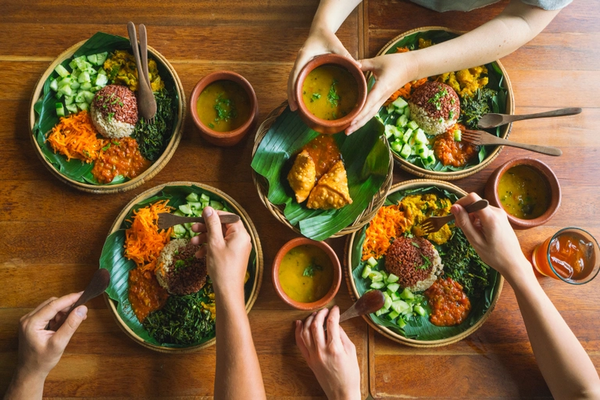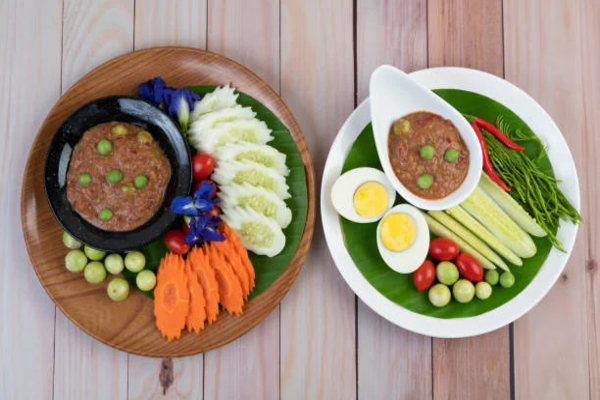Top Benefits of Traditional Indian Foods for a Balanced Diet and Wellness
- Daily Health
- 3 min
- May 28, 2024
- Rujuta Diwekar
- diet in india, healthy indian eating habits
Want to know how to nourish your body while caring for Mother Earth? Look no further than traditional Indian food. For centuries, Indian meals have been guided by balance, sustainability, and respect for nature — creating an Indian balanced diet that the modern world needs more than ever.
As the world faces hunger, malnutrition, and lifestyle diseases, many turn to trend-driven diets — keto, low-carb, intermittent fasting — which promise quick results but rarely deliver lasting health. In contrast, traditional Indian food celebrates local produce, whole grains, spices, and mindful cooking — a time-tested system that sustains both body and planet.
At Wellness Garden, a digital Bangalore-based platform, connects you with experts who design personalised plans using traditional Indian food. Rooted in Ayurveda and holistic therapies, these plans help you achieve weight, hormonal, and long-term wellness goals naturally.

Traditional Indian Diets: Ayurveda, Diversity & Plant-Based Wisdom
With global health challenges on the rise, studies— show that nearly 70% of Indians still follow traditional food habits, not out of nostalgia, but for their proven nutritional wisdom. These diets enhance digestion, hormone balance, energy levels, and long-term vitality, making the Indian balanced diet a simple and sustainable way to stay healthy.
Ayurvedic Wisdom for You
Ayurveda guides how foods influence your body and mind. By considering your dosha — vata, pitta, or kapha — meals can be selected and prepared to keep you balanced, energetic, and well. This means the principles behind traditional Indian food are naturally aligned with your overall well-being.
Diversity and Balance
A traditional Indian diet ensures nutrients from all food groups by including six tastes in every meal: sweet, bitter, spicy, astringent, salty, and sour. Regional staples vary — rice in the South, wheat in the North, millet in the West — combined with fresh vegetables, legumes, whole grains, and spices to provide essential vitamins, minerals, and antioxidants. Herbs like turmeric, cumin, and ginger enrich flavor while aiding digestion, immunity, and inflammation control. As nutrition expert Rujuta Diwekar highlights, returning to local, seasonal, traditional Indian food is a sustainable and scientifically supported way to maintain overall health.
Plant-Based Core & Sustainability
Traditional Indian meals are mostly plant-based, with lentils, chickpeas, beans, and seasonal vegetables forming the bulk of daily intake. Vegetarian practices make these diets environmentally friendly. In today’s era of climate challenges, choosing plant-rich, traditional Indian foods reduces ecological impact while promoting lasting wellness.
Top 7 Benefits of Traditional Indian Diets
Adopting a traditional Indian food approach is more than just eating healthy — it naturally prevents common lifestyle issues, balances your body, and supports long-term wellness. Here are the key benefits:

- High in Dietary Fiber
Whole grains, lentils, beans, and vegetables provide fiber to support smooth digestion, maintain a healthy gut, and prevent issues like constipation, bloating, and IBS.
- Supports Heart Health
Legumes, nuts, and spices like turmeric and garlic help regulate cholesterol and blood pressure, reducing the risk of heart disease, hypertension, and stroke.
- Boosts Immunity
A combination of fresh vegetables, fruits, herbs, and spices strengthens the immune system, helping the body naturally fight infections, inflammation, and seasonal illnesses like flu or respiratory infections.
- Balances Hormones Naturally
Ayurveda-guided food choices support hormonal regulation, menstrual health, and reproductive wellness. They are beneficial for PCOS, thyroid imbalances, and menopause-related changes.
- Provides Complete Nutrition
Traditional meals combine proteins, healthy fats, complex carbs, vitamins, and minerals — addressing deficiencies often caused by fad diets like keto or extreme low-carb plans.
- Preventing Lifestyle-Related Diseases
By focusing on whole, minimally processed foods, traditional Indian diets help reduce the risk of obesity, diabetes, metabolic syndrome, and fatty liver disease.
- Eco-Friendly and Sustainable
Plant-based staples and locally sourced seasonal foods make this balanced indian diet environmentally conscious while promoting mindful eating habits.
Indian Diet Plan for Weight Management
With so many fad diets promising quick results, a traditional Indian diet offers a natural, balanced, and sustainable alternative — combining the right portions of grains, lentils, vegetables, dairy, and spices to support digestion, energy, and long-term wellness. This approach ensures all essential nutrients, vitamins, proteins, and healthy fats are included in daily meals.
These are examples of meal balanced diet with Indian food that can be chosen and personalized based on individual needs, following Ayurveda principles to ensure nutritional balance and maximum results:
- Breakfast: Oats idli, poha, or upma with fresh fruit or yogurt. High in fiber, protein, and micronutrients, these options keep energy steady and support digestion.
- Mid-morning: Roasted chickpeas, sprouts, or seasonal fruit. Provides plant-based protein, vitamins, and minerals to curb hunger naturally.
- Lunch: Rice, millets, or whole-grain roti with lentils, vegetables, and raita. A complete meal delivering complex carbs, plant protein, fiber, vitamins, and probiotics.
- Afternoon: Fresh fruit, nuts, or seeds. Sources of healthy fats, omega-3s, and antioxidants for energy and satiety.
- Dinner: Paneer tikka, vegetable stir-fry, and whole-grain roti. Light yet nourishing, it supplies protein, calcium, vitamins, and essential minerals.
Choose the Right Traditional Indian Diet Plan
A traditional Indian diet can be tailored for anyone, but it’s best to seek guidance when needed. Consult a certified Ayurvedic practitioner (BAMS), a registered nutritionist, or a licensed dietitian to balance meals and ensure optimal results. Early support makes your traditional Indian diet personalized, effective, and safe, helping you achieve long-term wellness naturally.
Tips to follow at home:
- Portion control: Use smaller plates and measure servings.
- Mindful eating: Focus on meals without distractions.
- Seasonal and local foods: Choose in-season ingredients for maximum nutrition.
- Spices and herbs: Include turmeric, cumin, and ginger to support digestion and immunity.
- Stay hydrated: Drink water regularly.
- Light activity: Daily walks, yoga, or stretching complement your meals.
Embrace Traditional Indian Diets with Wellness Garden
India’s rich culinary tradition offers plant-based, varied, and sustainable diets that nourish the body and support long-term wellness. With Wellness Garden, certified Ayurvedic practitioners, nutritional coaches, and dietitians across Bangalore can personalise your traditional Indian diet and integrate natural therapies for complete health. Book a session to make your diet balanced, effective, and sustainable.
FAQs
1. What is the 3-3-3 rule diet?
This means three balanced meals a day, every three hours, with carbs, protein, and healthy fats.
2. Why is the traditional Indian meal considered balanced?
It naturally combines grains, lentils, vegetables, and spices for complete nutrition.
3. Can everyone follow traditional Indian foods?
Yes, with minor adjustments for allergies or intolerances.
4. Can Indian foods align with natural therapies?
Yes, they complement Ayurvedic, yoga, and naturopathy-based treatments.
5. Can experts help personalise my diet?
Yes, Wellness Garden connects you to experts who tailor diets in India to your needs.
- Table of Contents
- • Indian Food
- • Traditional Indian Diets
- • Top 7 Benefits
- • Diet Plan For Weight
- • Choose Right Diet
- • FQAs
Recent Posts
Join Our Newsletter
End note from WG Team
WG Team
Disclaimer: This information is provided for educational purposes and should not be construed as medical advice. Please consult with healthcare practitioners before undertaking any changes in wellness routines or adding new therapies.
Need Expert Guidance You Can Trust?
Speak to Our Wellness Garden Specialists
Latest Blogs
Check out some of your blogs related to your interest.
- February 17, 2026
- January 23, 2026
- 2 Mins

- January 12, 2026
- NIH
- 3 Mins

- December 14, 2025
- 3 Mins


